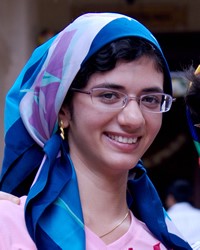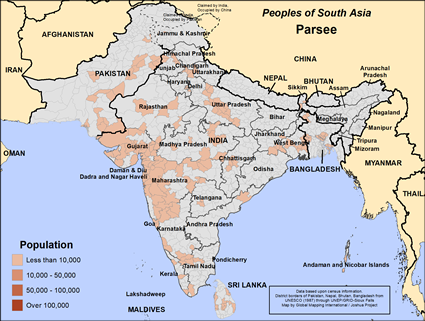The Parsee people, which literally means inhabitant, are of the Indo-Iranian affinity bloc. They are known as Zoroastrians, Zarathushti, Parsees, Parsis, and Zarthusht.
Fasli (seasonal), Kadmi (ancient) and Shahenshahi (kingly) are their different calendars. The Parsee (Zoroastrian) calendar has twelve months, and each month has thirty days. At the end of the 360-day period, there are five additional days called Gathas. Each day of the month, and each month is named after an angel. Zoroastrian calendar does not have a leap year. The Zoroastrian calendar cycles, called Fasli, Kadmi, and Shahenshahi, begin at different times of the Gregorian calendar.
They are found in Iran, Afghanistan, Pakistan, China, Bangladesh, Canada, India, Kazakhstan, Tajikistan, Sri Lanka, Uzbekistan, the United States and the United Kingdom. Parsees are also found in Canada and have fire temples and associations there.
They speak a dialect of Gujarati which is considerably different from Gujarati. Some speak Farsi and Dari.
This people group traces its origin to the Persian Kings of the Old Testament including King Darius, Cyrus, and Xerxes who aided in the rebuilding of the Temple. In the Old Testament, Cyrus is noted as the only Gentile who was called "anointed". The magi who came to worship at Jesus' birth are also believed to have been Parsee. Because of their ancient heritage, which is dated at before 3000 BC, they are very proud and cling to their identity of royal heritage. They are known as the Zoroastrian Iranians who refused to adopt Islam during the Arab conquest.
Parsee communities are tightly knit closed groups that view themselves as superior to all other religious groups and races. Parsee women who marry outside their people group are no longer considered Parsee. One must be born Parsee and must participate in the blood covenant ritual to truly be Parsee. This ritual takes place just before children reach puberty. The child is bathed and then offered bull's urine, considered to be the blood of their god, by the temple priest and thus establishes a covenant allowing their soul to be one with god. Then the child is given a white shirt and a band of the covenant that is tied around the waist. These articles are never to be removed and are to be worn the rest of their lives as a reminder of the covenant. The Parsee people hold to a code of conduct which is summarized as, "good thought, good word, good deeds."
Their primary religion is Zoroastrianism. Zoroastrianism has fire as its supreme deity of worship believing it to be the son of god. All religious rituals and rites of passage are performed with burning fire present, and it is often lit by sandalwood and oil. Fires burn continuously in homes, and the temple fire is forbidden to burn out. Fire worship may include one falling prostrate before the flames.
They do hold to the belief in a Wise Creator god and wisdom is the most valued character trait by Zoroastrians. Guardian angels, who are treated more like a magical genie to disperse wishes, are also primary to religious beliefs -- conscience is the most important of such angels. Resurrection and salvation are part of their religious terminology, though they differ in meaning from Christian definitions.
Ancestor worship is an emphasized aspect of worship. Pictures of deceased loved ones hang in homes and are prayed and bowed to. August marks a time dedicated to ancestor worship during which forgiveness is sought and the spirits are asked to join the people. Demons manifest themselves in the likeness of lost family members.
The Parsee people celebrate six seasonal festivals known as Gahambars. Each festival lasts five days and is a time of worship dedicated to Ahura Mazda. After worship, there are assemblies of feasting, fellowship, and acts of goodwill. Upon a baby's birth, mother and child are confined with a lamp to ward off demons. Children are often given three names, the first is a personal name, the second is the father's name, and the third is the family name.
Parsees respect other faith systems and gods. The Bible is treated honorably as a religious text and Christ is also seen in a positive light and as a Messiah, though multiple idols may be worshiped.
Zoroastrians are extremely generous to the poor and needy. They believe they go to heaven by reading or reciting their Zoroastrian scriptures. Zoroastrian scriptures are the biggest and most difficult obstacle to their conversion to Christianity.
Zoroastrian's highest temples are in Udwada and Mumbai, India.
An important trait for a missionary to Zoroastrians must be unconditional agape love as in 1 Corinthians 13:4-8:
"Love is patient, love is kind and is not jealous; love does not brag and is not arrogant, does not act unbecomingly; it does not seek its own, is not provoked, does not take into account a wrong suffered, does not rejoice in unrighteousness, but rejoices with the truth; bears all things, believes all things, hopes all things, endures all things. Love never fails."
Zoroastrians are prejudiced against non-Zoroastrians, but that prejudice can be negated by a missionary who is highly educated.
Pray for loving workers to be thrust out to the Parsees.
Pray for them to have the spiritual hunger it takes to embrace the King of kings.
Pray for disciples who will make Parsee disciples.
Scripture Prayers for the Parsee in Tajikistan.
Corrective edits have been made to the original profile from a reputable, anonymous source.
| Profile Source: Joshua Project |












